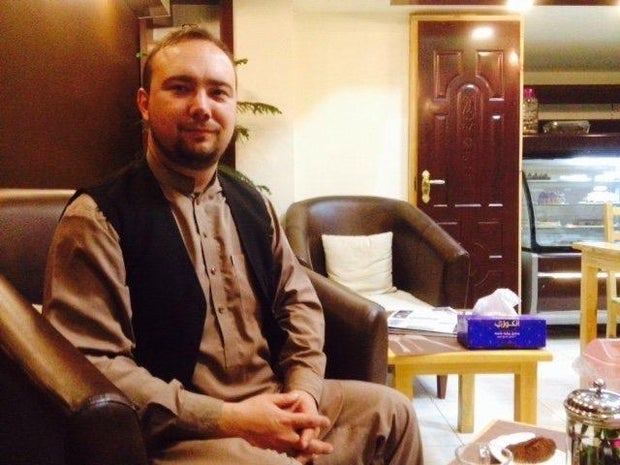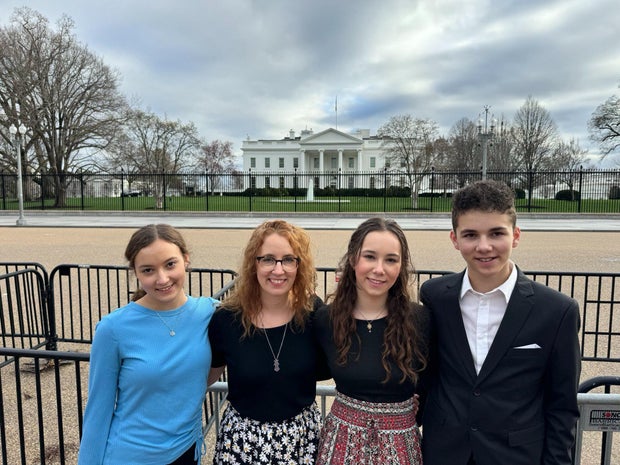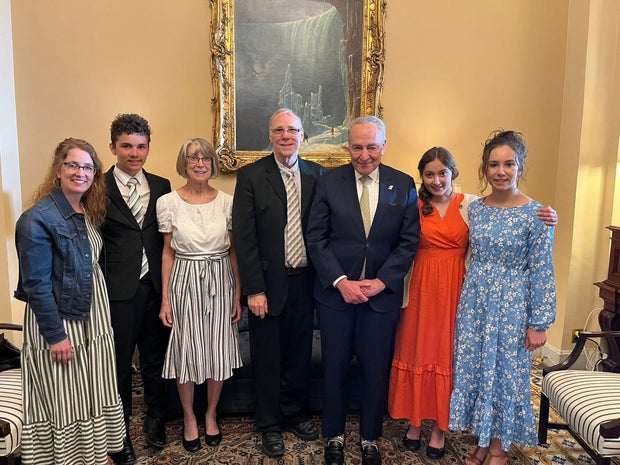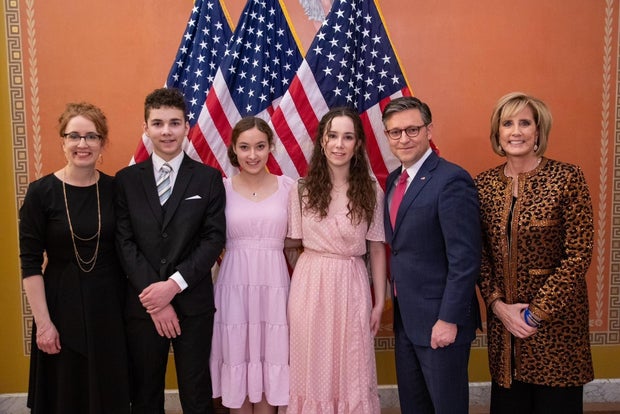When news of the historic, multi-country prisoner swap resulting in the release of three Americans who had been detained in Russia broke last week, Anna Corbett absorbed it slowly, fighting back tears.
“People kept texting me, emailing me about it, saying, ‘Oh, we wish it were Ryan,'” she said. “It was just so painful. I just had to distance myself, and I couldn’t read all the details of how all the negotiations were done.”
“I’m really happy for them, but it’s bittersweet,” she told CBS News. “I see how much focus it took for that to come together and to bring Americans home. It just takes effort. And I’m not seeing that effort.”
Courtesy Corbett family
Almost exactly a week later, following a set of meetings with national security council officials, Corbett, 43, found herself standing outside the West Wing of the White House, enlisting her teenage daughter, Ketsia, in taping a video on her phone. Anna felt she had run out of options, and wanted to say publicly that her entreaties for a meeting at higher levels — specifically with President Biden and national security adviser Jake Sullivan — had again been ignored.
“I am standing just yards away from the West Wing of the White House, where the president is sitting and where national security adviser Jake Sullivan is also sitting,” Anna says in the video, her voice shaking slightly. “When I met with [Sullivan] in January, he said that he would meet with me again by the State of the Union if Ryan wasn’t home.”
Courtesy of the Corbett family
“I have written emails, I have asked to meet with him — they’ve all been ignored. He broke his promise to me,” Anna continued. “Please meet with me and do everything you can to bring Ryan home as soon as possible.”
That evening, she got one of the most encouraging calls she has gotten in months.
Two years of detention
August 10 will mark two years since Anna’s husband, 41-year-old Ryan Corbett, was arrested, along with three associates – a German citizen and two Afghans – during a business trip to northern Afghanistan.
Before Ryan’s abduction, the family had lived in Kabul for over a decade, from 2010 to 2021, where Anna homeschooled their three children, including their son Caleb, who was born in Afghanistan in 2010. Ryan, who is fluent in Pashto, worked for local NGOs before starting a microloan and consulting business in the Afghan capital.
The family fled Kabul amid the U.S.’ chaotic withdrawal from Afghanistan in August 2021. A year later, in August 2022, Ryan made the fraught decision to return to the country on a business visa to support the staff employed through his business, Bloom Afghanistan, which at the time was still operational.
The State Department’s travel advisory for Afghanistan was at its highest level — Level 4: Do not Travel — amid what the Department warned was terrorist activity and the risk of arbitrary detention.
The four men’s arrest came days after a U.S. drone strike killed Al-Qaeda leader Ayman al-Zawahiri, on July 31. The three associates who traveled with Ryan have since been released, but he continues to be held in a facility run by the Taliban’s General Directorate of Intelligence.
He has been accused but never formally charged by the Taliban of anti-state activities — a common accusation against Westerners and one his family denies. The State Department deemed him “wrongfully detained” in September of 2023.
Courtesy of the Corbett family
Courtesy of the Corbett family
According to his family, who has spoken by phone with Ryan and with other Western detainees who met Ryan and have since been released, he has been kept in a windowless basement cell, where the Taliban have threatened to beat him and have forced him to listen to the torture of other prisoners. He is extremely malnourished and has been suffering from fainting episodes and numbness in his extremities.
“He is definitely weakening and deteriorating,” Anna said in a recent virtual interview with CBS News. She worries incessantly that Ryan could die at any moment, either from maltreatment or neglect.
She also worries that for two years, the White House has not been focused at the necessary levels on finding a way to get her husband home.
“It should not be the case that only detainees with high profiles get this White House’s full attention,” she said in a statement marking two years this week since Ryan’s detention began.
Anna has visited Washington, D.C., 13 times in the past 24 months, including to attend the State of the Union address in March at the invitation of Republican congresswoman Claudia Tenney of New York. Her children attended as guests of House Speaker Mike Johnson.
She has met multiple times with several influential members of Congress, including Senate Majority Leader Chuck Schumer and Minority Leader Mitch McConnell — both of whom have personally appealed to the White House to take meetings with Anna — as well as House Foreign Affairs Chairman Michael McCaul, and others.
She has taken part in multiple rounds of public and private congressional testimony. At her urging, both the House and the Senate have passed resolutions calling for Ryan’s immediate release. Attorneys for the family have also filed urgent petitions with the U.N. Special Rapporteur on Torture and the U.N. Working Group for Arbitrary Detention, and in June, a UN expert said Ryan risked dying in detention if he does not receive adequate medical care.
Though she has met consistently with members of the national security council and officials at the State Department, including UN Ambassador Linda Thomas Greenfield and Special Presidential Envoy for Hostage Affairs (SPEHA) Roger Carstens, and has spoken once with Secretary of State Antony Blinken, what she most wants now and believes could make the most difference in Ryan’s case is getting President Biden and his top advisers to pay attention.
In the past six months, she said she has sent dozens of requests through multiple channels to meet with Sullivan and Mr. Biden, but that her requests had, until this week, been ignored.
“I’m not rich and famous. I don’t have as many resources as others,” Anna said. “I just don’t know what else can be done.”
Taliban demands
In addition to Ryan, the State Department has said publicly the Taliban are holding at least two other Americans: George Glezmann, a 65-year-old Atlanta native detained while on a tourist visit in December of 2022, and Mahmood Habibi, a dual American-Afghan national and civil aviation expert who was detained, along with dozens of other Afghans, on the same day as Ryan Corbett, in another part of Afghanistan.
In recent months, Ryan and George have been held in the same cell in the GDI-run facility, according to people familiar with their circumstances. CBS News could not confirm where Habibi is being held, and Taliban officials have offered conflicting messages over time as to whether Habibi is considered to be among the American prisoners it is holding.
In early July, Taliban spokesman Zabihullah Mujahid told CBS News the group had discussed U.S. detainees with American officials on the margins of a global security conference in Doha, Qatar, but did not specify any names or numbers of prisoners who may be involved in a potential exchange.
“There was a focus on the exchange of detainees, we [are] emphasizing the importance of Afghan prisoners held by the U.S. and suggesting a swap for American citizens detained by the Taliban,” Mujahid said. “If the U.S. values its citizens, the Taliban equally value their own people.”
Three separate senior Taliban officials told CBS News in July the group had been clear in recent meetings with U.S. officials about its desire for a deal that would potentially involve releasing three American prisoners in exchange for three Afghan prisoners held by the U.S.: Mohammed Rahim al-Afghani, the last Afghan national held in Guantanamo Bay, as well as two other Afghan nationals currently held in U.S. prisons on drug-related charges.
Rahim, who was transferred to Guantanamo Bay from CIA custody in 2008, and is believed by the U.S. government to have been a close associate of Osama bin Laden, has not been charged.
The Taliban sources did not name the two other Afghans, nor did any U.S. officials who spoke with CBS News.
One of the senior Taliban officials, who is with the GDI and claimed to handle the cases of foreign national prisoners, said Habibi had been arrested and was being held in a “prisoner guest house” in Kabul. That official, speaking with CBS News earlier this week, described Habibi’s case as “complicated.”
When the other senior Taliban officials were contacted by CBS News again in August, however, two changed their previous statements, saying the group only held two American prisoners, and one Taliban official connected with the GDI denied the group held Habibi at all.
“The deal should not be complicated, as we have had similar successful exchanges in the recent past,” one of the senior Taliban officials said. “The Taliban regime has no complications. It is the USA that has complications and cannot make a solid commitment.”
Rahim’s “detention is a major barrier to progress in our negotiations,” another one of the senior Taliban officials who said he had knowledge of the talks told CBS News.
Rahim’s attorney, James Connell, told CBS News while on a visit to Guantanamo Bay on Friday that he has not discussed a potential prisoner swap with any U.S. or Taliban official.
“No one has contacted me about any proposed resolution,” Connell said.
Connell added that Rahim has not been cleared by Guantanamo’s Periodic Review Board, which determines “whether continued detention of particular individuals held at Guantanamo remains necessary to protect against a continuing significant threat to the security of the United States,” according to its website.
Multiple American officials familiar with the talks declined to comment on any discussions with the Taliban or confirm what the Taliban officials who spoke with CBS News claimed they had proposed.
One U.S. official said the government’s focus was on bringing the three Americans home. A spokesman for SPEHA declined to comment.
A spokesperson for the national security council said, “The U.S. government has engaged with Taliban representatives in pursuit of the immediate and unconditional release of Americans wrongfully detained in Afghanistan on humanitarian grounds.”
“The Biden administration remains fully committed to doing everything we can to bring home Americans who are wrongfully detained abroad, including Ryan Corbett,” the spokesperson said.
But for her part, Anna says it remains unclear to her what the U.S. government may be willing to consider.
“It’s been two years, and there’s never been a solution put on the table that comes close to allowing both sides to reach a deal,” she said.
U.S. efforts today
During a press briefing Thursday, State Department spokesperson Matthew Miller acknowledged the approaching two-year mark of Corbett’s and Habibi’s detainment and said bringing them and Glezmann home continues to be a “top priority.”
“We are deeply concerned about the well-being of Americans unjustly detained in Afghanistan — Mahmood, Ryan, and George Glezmann — and raise their detentions in every engagement we have with the Taliban,” Miller said, though he did not immediately specify how many engagements there had been.
“[Special Representative for Afghanistan] Tom West pressed for the immediate and unconditional release of U.S. citizens unjustly detained in Afghanistan directly with the Taliban in July at Doha 3,” he later added, referring to the third U.N.-facilitated international gathering hosted by Qatar on a global approach to Taliban rule. “We continue to press for their release at every opportunity. Due to the sensitivity of these discussions, we do not make every engagement public.”
In his comments Wednesday, Miller noted that both Corbett and Glezmann had been officially determined to be “wrongfully detained,” a legal status conferred by the State Department on Americans held abroad according to criteria established by the Levinson Act. While “wrongfully detained” status is not a requirement for release, it unlocks U.S. government resources for family members and can help elevate a detainee’s profile.
Habibi is considered unjustly detained, Miller said, adding some of the Levinson Act criteria had not been applied either because they did not fit or because the U.S. still had insufficient information about his case.
Since the 2021 withdrawal of U.S. military forces from Afghanistan, the American government has had no formal diplomatic ties with the Taliban and instead has adopted a position the State Department describes as “pragmatic engagement.” The Department established an office known as the “Afghanistan Affairs Unit” in Doha, Qatar to manage diplomatic and consular issues in Afghanistan. Qatar has served as the U.S. protecting power in Afghanistan since 2021.
Intervention by the Qataris in recent months has made a difference in Ryan’s treatment, Anna said. After a team from Qatar met with the Taliban last spring, Ryan’s captors increased the amount of exposure to sunlight he receives — now 30 minutes a week, up from 30 minutes a month.
After Anna traveled to Doha in May to meet with Qatari officials, and they in turn engaged with the Taliban, she said Ryan has been able to call home roughly every two weeks, while previously months could pass without a call.
While the increased tempo of phone calls has offered important reassurance to Ryan and his family, Anna said the calls have also fueled concerns about his deteriorating health.
She and her children “prepare for each call to see what news we’ll share with him, but I also don’t push them to have to talk if they don’t feel up for it,” she said. “I know it means a lot for him to hear their voices and hear news from them.”
But, she added, “When he’s not been doing well emotionally, he doesn’t even ask about us or the kids.”
“We know then he’s really not well,” she said, her voice catching.
During her meetings in Washington this week, Anna said she pressed administration officials for specifics about a plan to get Ryan home, but had still come away with little clarity.
“This up and down, back and forth, trying to push and just feeling like I’m just running in circles and not seeing progress – it’s so frustrating,” she said. “If I were at a two-year mark and I really felt like, ‘Oh my goodness, we’re really probably really close to this, I think I would feel better, but I don’t.”
“And with the election season in full swing, I just don’t know what this means, and Ryan’s getting worse,” she said.
A representative for the Corbett family who has helped facilitate Anna’s meetings in Washington said there was hope President Biden’s announcement last month that he would not seek reelection might increase the chances he would be able to take a personal interest in Ryan’s case during his final five months in office.
“Russia was hard. This is easy, and could have been resolved a long time ago if it had been put before the president,” the representative said. “The president has a window to get this done. The support on the Hill is there. We’re trying to get his attention before it’s too late.”
House Foreign Affairs Committee Chairman Michael McCaul of Texas, whose office has met frequently with Corbett’s family and held public hearings with Anna, also called for more urgent engagement from the White House in particular.
“Despite repeated requests, President Biden has still not met with Ryan’s wife Anna or their family,” McCaul said. “Ryan’s mental and physical health is deteriorating daily, yet the Biden-Harris administration still has no plan to bring him home. As chairman of the House Foreign Affairs Committee, I will not rest until Ryan is returned home to his family.”
Senate Minority Leader Mitch McConnell of Kentucky, where Ryan’s parents and family reside, also said in a statement,”For nearly 730 days, Ryan Corbett has languished inside a basement cell, denied his most basic human rights. As his health continues to deteriorate and his family suffers without their father, Ryan’s safe return is long overdue.”
“I call upon the Taliban to release all Americans wrongfully detained,” McConnell said.
Aides to Senate Majority Leader Chuck Schumer, whose office has also met multiple times with Anna, did not respond to several requests for comment.
On Wednesday, after three days of meetings across offices in Washington – and roughly four hours after her video outside the West Wing was posted – Anna said she received two calls from the White House, and two emails the following day.
“I have a meeting on the calendar,” she said, giving a rare, broad smile. She is now scheduled to meet Jake Sullivan on August 19.
“I’m expecting to get answers,” she said.
and
contributed to this report.



